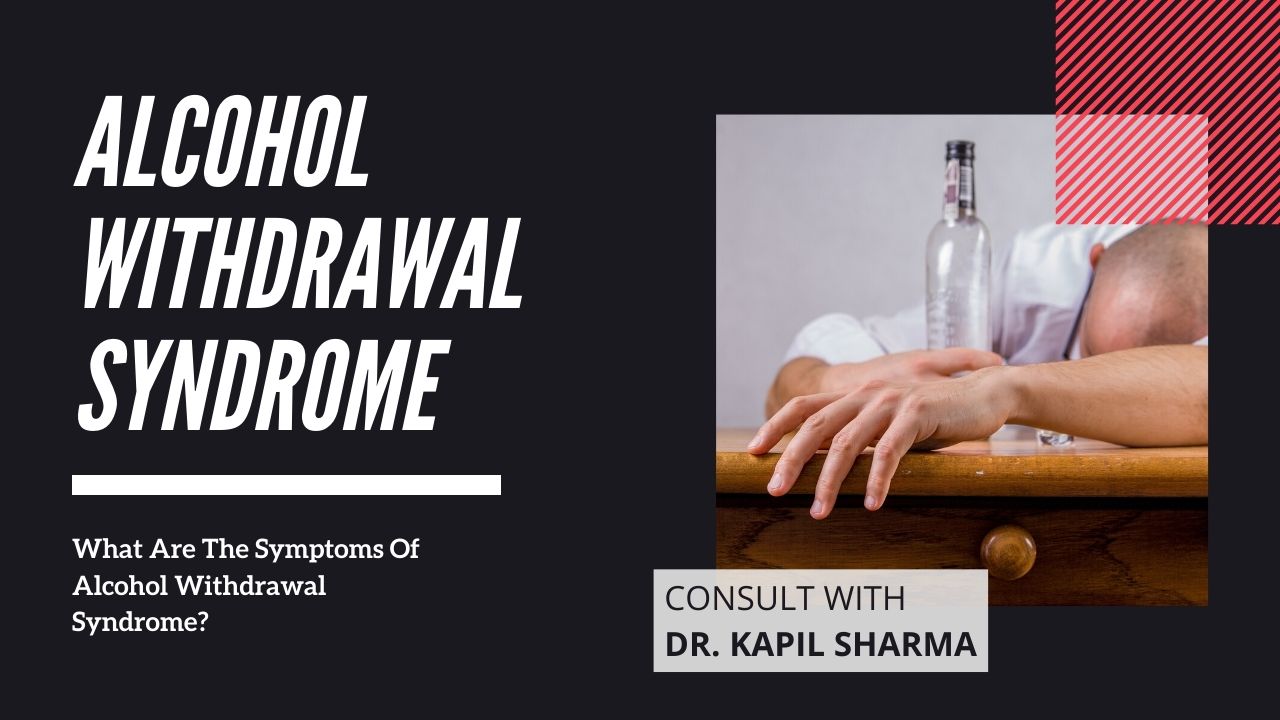
What Are The Symptoms Of Alcohol Withdrawal Syndrome?
Symptoms of alcohol withdrawal syndrome may develop within 6–36 hours after the abrupt stoppage or decrease of alcohol amount. Symptoms can vary from sympathetic hyperactivity, nervousness, and agitation to hallucinations, delirium tremens, and seizures.
A psychiatrist asks their patient about detailed history. It is an important duty of the patient and their caregivers to provide complete and detailed information about the patient’s drinking habits. The psychiatrist asks about the total duration of alcohol addiction, amount of alcohol, frequency of alcohol intake, causes of alcohol addiction, associated health problems like the status of liver function test, behavior after alcohol consumption, legal problems due to alcohol, the financial burden due to alcohol addiction, work performance, social responsibility of alcohol addict person. Past treatment record, causes of previous treatment failure, history of alcohol withdrawal symptoms. The Cut down-Annoyed-Guilty-Eye opener (CAGE) and Alcohol Use Disorders Identification Test (AUDIT) questionnaires may help to identify alcohol-dependent patients.
The treatment for alcohol withdrawal syndrome is chosen on the basis of the patient’s previous history and symptoms of alcohol withdrawal. Severe alcohol withdrawal may need ICU admission. It’s paramount to handle psychoautonomic hyperactivity.
Alcohol use disorder (AUD) or Alcohol addiction is estimated to affect approximately 5-20%. Almost all patients with alcohol dependence suffer alcohol withdrawal syndrome (AWS).
Alcohol withdrawal syndrome presents as neuropsycho autonomic hyperactivity such as nervousness, tremors, irritability, agitation, anxiety, sleeplessness, confusion, hypertension, tachycardia, increased sweating. Alcohol withdrawal syndrome usually develops in alcohol dependent patients within 6–36 hours after discontinuation or decrease of alcohol amount. It is a potentially life-threatening clinical condition whose severity ranges from mild forms characterized by tremors, nausea, sleeplessness, anxiety to severe symptoms of hallucinations, seizures.
What are the symptoms of alcohol withdrawal syndrome?
1. Withdrawal Symptoms, Last for 6–12. Presents with Tremors, diaphoresis, nausea, vomiting, hypertension, tachycardia, hyperthermia, tachypnea
2. Alcoholic Hallucinosis, starts after 12–24 hours. Auditory, tactile, and visual hallucinations are common in Alcohol withdrawal. Patients may feel insects in their clothing, body in tactile hallucinations. The patient sees imaginary people, animals in their visuals during visual hallucinations. The patient starts responding to imaginary voices in auditory hallucinations. Voices may be threatening in auditory hallucinations.
3. Alcohol Withdrawal Seizures happen in 24–48 hours. It is characterized by generalized tonic-clonic seizures GTCS. The patient gets unconscious and body movements happen. Tonic-clonic seizures usually with little or no postictal period.
4. Delirium Tremens happens in 48–72 hours. The patient is disoriented to either time or place or persons or all these three parameters. Hallucinations, irrelevant talks, sleeplessness are common symptoms of delirium tremens.
Delirium tremens represents the severe alcohol withdrawal syndrome. It may happen even though in properly and adequately treated patients of alcohol addiction. Delirium tremens occurs in almost 5% of patients.
Generally, it happens 48–72h after the last intake of alcohol. Sometimes it begins almost 1week to 10 days later. Symptoms of delirium tremens generally last for2–7 days. Delirium tremens is characterized by fluctuating consciousness.
There is a change in cognition and perception. Other symptoms include hyperactive autonomic system e.g. sweating, nausea, palpitations, hypertension, and tremors. Psychological symptoms of delirium tremens include anxiety, nervousness, hallucinations, fear, sleeplessness, irrelevant talks, poor memory, disorientation to time, place, and person.
In delirium, tremens patient may harm oneself and others also, so safety is important. There are some medical complications of delirium tremens e.g. aspiration pneumonia, arrhythmia, or myocardial infarction, which may lead to death.
Treatment of acute and protracted alcohol withdrawal syndrome is important because some symptoms may last from weeks to months.
Goals of the treatment
- Minimize the severity of symptoms
- Increasing patient’s motivation to maintain long-term alcohol abstinence.
- Facilitate the entry into a relapse prevention program.
- Treating associated problems e.g. liver problems, digestion problems, depression, anxiety, psychosis, other substance addiction, hypertension diabetes.
- Maintaining a good healthy lifestyle, healthy food.
Why hospital admission is better than home-based treatment of alcohol addiction?
The facility of a good alcohol de-addiction hospital in Jaipur has a difficult task for help seekers. A good de-addiction hospital facility comes from the building of a hospital rather it comes from a caring, dedicated and knowledgeable Psychiatrist/ psychologist. A caring and knowledgeable best psychiatrist in Jaipur is now available. Deaddiction treatment needs patience on the Psychiatrist’s side as well as on the family side. We provide selective, customized, and patient oriented Deaddiction treatment because we keep Patients’ inflow limited. We keep limited indoor patients to provide the highest possible standards of treatment.

